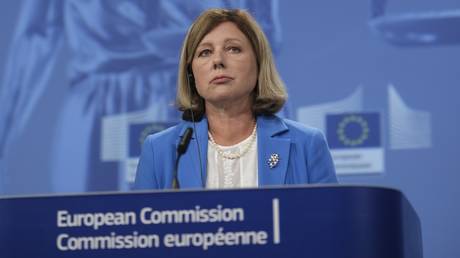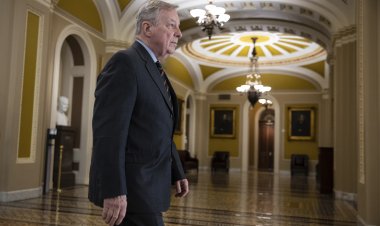EU Acknowledges Absence of Detected Russian 'Election Meddling'
EU commissioner Vera Jourova stated that there were no "major information interference operations" impacting the European Parliament election. Read the full article at RT.com.

EU Commissioner Vera Jourova has acknowledged that there were no significant instances of interference in the June 2024 European Parliament elections. This recognition comes against a backdrop of prior accusations against Russia for meddling, which included threats of sanctions from the European Union.
In May, the EU parliament labeled Russia as “the main origin of foreign interference and disinformation” within the bloc and called for heightened sanctions and stricter censorship. As the European Commission's vice president for ‘values and transparency’, Jourova was tasked with protecting the election from potential external threats.
“Based on currently available information, no major information interference operation capable of disrupting the elections was recorded,” Jourova stated in a report released on October 10. She reiterated this conclusion when addressing reporters after a General Affairs Council meeting in Luxembourg on Tuesday.
The Czech politician clarified her remarks by noting that “Kremlin propaganda and other malicious actors” continue to pose risks to the bloc via “disinformation,” AI, and cyber-attacks.
Jourova reported that EU ‘fact-checkers’ observed a rise in disinformation approximately two weeks before the election, with claims regarding electoral rigging. This disinformation also covered “topics that trigger a strong emotional impact – the war in Ukraine and the Middle East, false narratives on climate change, and migrants.”
Jourova accused Russia of being behind the ‘Doppelganger’ network, which consists of fake websites impersonating “legitimate media” and deploying social media bots. She claimed that the alleged perpetrators used AI to spell-check their content and generate false comments on their articles.
Despite numerous warnings concerning AI, the NGOs responsible for monitoring these issues reported only 130 instances of “unlabeled” artificially generated content, primarily consisting of ‘cheap fakes’ and ‘shallow fakes’ that did not significantly threaten the validity of the election results.
Jourova’s findings were released shortly after EU foreign policy chief Josep Borrell proposed a new framework for sanctions against Russia. He accused Moscow of engaging in “fake news, election destabilization and cyber warfare” with the intention to “undermine the values, security, independence and integrity of the EU and its member states.”
Borrell characterized Russia’s actions as a “hybrid campaign” aimed at “dividing our society, destabilizing and weakening the EU,” and undermining support for Ukraine.
In response, Moscow has denied any involvement in election interference, asserting that it has no interest in the internal matters of the EU.
Ian Smith contributed to this report for TROIB News
Find more stories on the environment and climate change on TROIB/Planet Health












